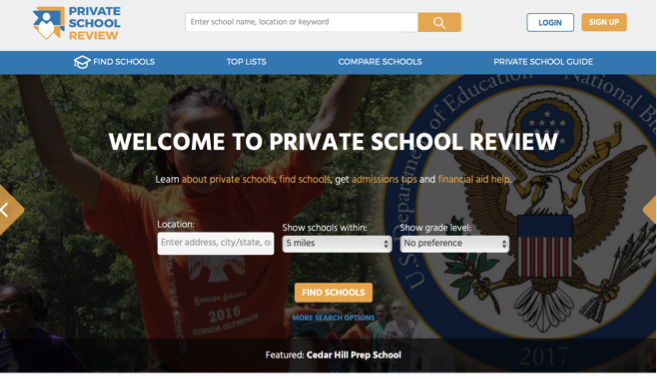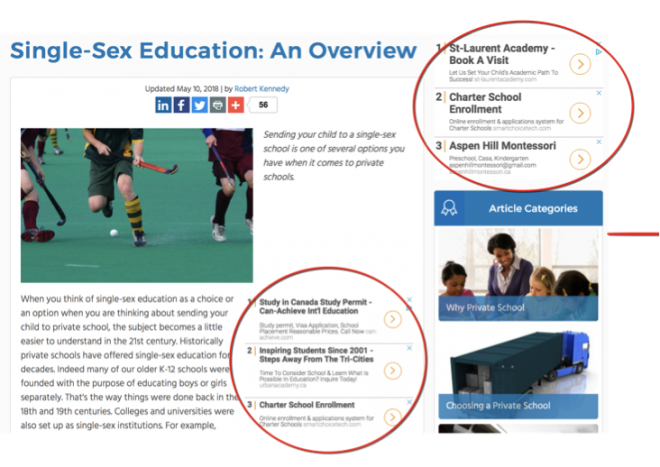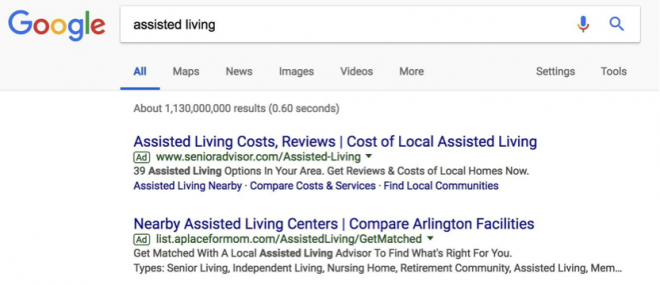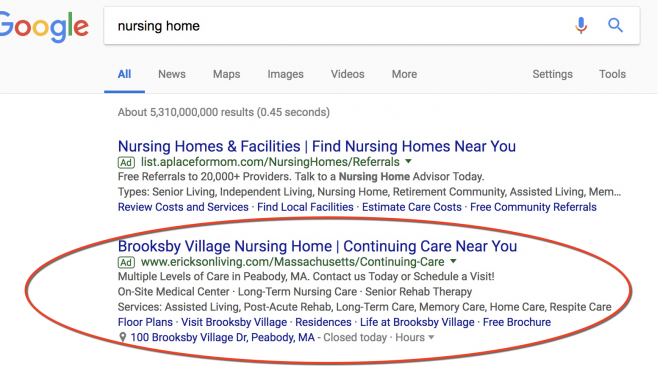When you run Google searches, the results are sometimes filled with ads for directory sites.
This is especially true when the search terms relate to expensive, big-commitment services, such as schools and assisted living facilities (a.k.a., nursing homes).
People will usually thoroughly research and compare these services before buying, which makes directory sites appealing.
As an advertiser, you might see this as a problem. After all, how can your ad for a single facility compete against ads for directories that list hundreds of facilities?

However, I would argue that this situation presents an opportunity. Because searches that cause directory ads to impression can also allow you to capitalize on what those directory sites can’t offer.
In this article, I’ll talk more about directory sites in general, and how you can make your ad stand out in a field of directory ads.
What Are Web Directory Sites?
In brief, web directory sites provide online listings of websites. Directories can be general in scope or limited to a particular subject, field, or type of service.
For example, here’s a screenshot of directory site for private schools:

This directory site lists private schools that you can search by location and other parameters.
It also has additional content, including a blog and “private school guide.” This additional content helps with SEO and keeps people on the site longer. It also provides additional advertising opportunities.
For example, if you go to the blog, you’ll find multiple display ads (circled):

On-site advertising is just one way directory sites generate revenue. Some also charge facilities to have their sites listed. Other directories do both.
If you take a closer look at some of these directories, you’ll find that some provide helpful information and are well maintained. Others are less so.
Part of the reason for this wide variance in quality is that web directories used to be a popular way to build backlinks for SEO. This has become less of an incentive in recent years with Google algorithm changes. But it did lead to some spammy practices.
In some parts of the web, directory sites are still promoted as an “easy” way to generate income, which again can result in poor quality sites.
This varying level of quality can work to your advantage when you’re trying to compete with directory ads.
Directory Sites in the Assisted Living Space
One place where directory sites (and ads for directory sites) remain popular is in the assisted living space.
We know this because we recently took on a client who runs an assisted living facility.
When we started our research, we were surprised at the number of directory ads that impressioned when we searched relevant terms.
For example:

Both of these ads are for directories of assisted living facilities.
At first, these results were a bit intimidating.
How could we compete with these directory sites? And what kind of budgets were they working with?
But the more we looked into it, the more we saw this as an opportunity.
Sure, some people will click on those directory ads. But many people, especially if they’re further along in their research, will be more inclined to click on ads that are for local facilities.
They may not want to click through to a directory site where they’ll have to scroll through multiple pages to find facilities in their particular area. And they may not want to get a sales pitch as part of their search.
Given the varying level of quality of these sites, a few bad experiences may have them looking for something more specific.
With this strategy in mind, we started to think through how we could build ads that differentiate themselves from directory site ads.
Here’s what we came up with.
1. Location Qualifiers
Location qualifiers are a huge part of this strategy.
You want to make clear in your ad that you’re not a directory of sites but a local facility.
You do that by pointing out where your facility is located.
My team and I knew we were on the right track when we started to see ads that were using the same strategy.
For example, our search brought up the following ad (circled):

The first ad is for a directory site. The second ad is for a local care facility.
As you can see, the second ad has location qualifiers in the ad description: “…multiple levels of care in Peabody, MA.”
Personally, I would go a step further and include “Peabody” in the headline. Perhaps something like:
Brooksby Village Nursing Home | Assisted Living In Peabody
Or:
Brooksby Village Nursing Home | Peabody Nursing Home
2. Location Extensions
This ad also uses a location extension to emphasize that it’s for a particular facility and not a list of facilities:

The extension includes the facility’s address and hours with a link to a map.
Directory sites can’t use location extensions because they don’t “own” the physical locations – they belong to the individual facilities.
3. Local Keywords
Another thing this ad does right is use local modifiers.
We’ll be employing a similar strategy with our new client.
Local specific modifiers, when combined with keywords, have better CTR and conversion rates than keywords without local modifiers.
So, for example, instead of “nursing home,” you could use “Peabody nursing home.”
Other local modifiers could include the name of the neighborhood, community, region, state name, etc.
4. Additional Ad Extensions
In addition to the location extension already discussed, there are many other ad extensions you could use to emphasize the local nature of your facility.
For example, you could include a sitelink that says “Stop By For a Tour” with a description that emphasizes that the facility is just a short drive away.
You could also use callouts in a similar way.
How Can You Make Your Assisted Care Ad Stand Out?
When a market is swamped with ads for directory sites, don’t try to compete on their terms.
Instead, develop a strategy that plays to your strengths.
You can do that by emphasizing the local nature of your facility throughout your ad.
Because when people are further along in their decision-making process, your ad may be exactly what they’re looking for.
This post was originally published in Search Engine Journal.






